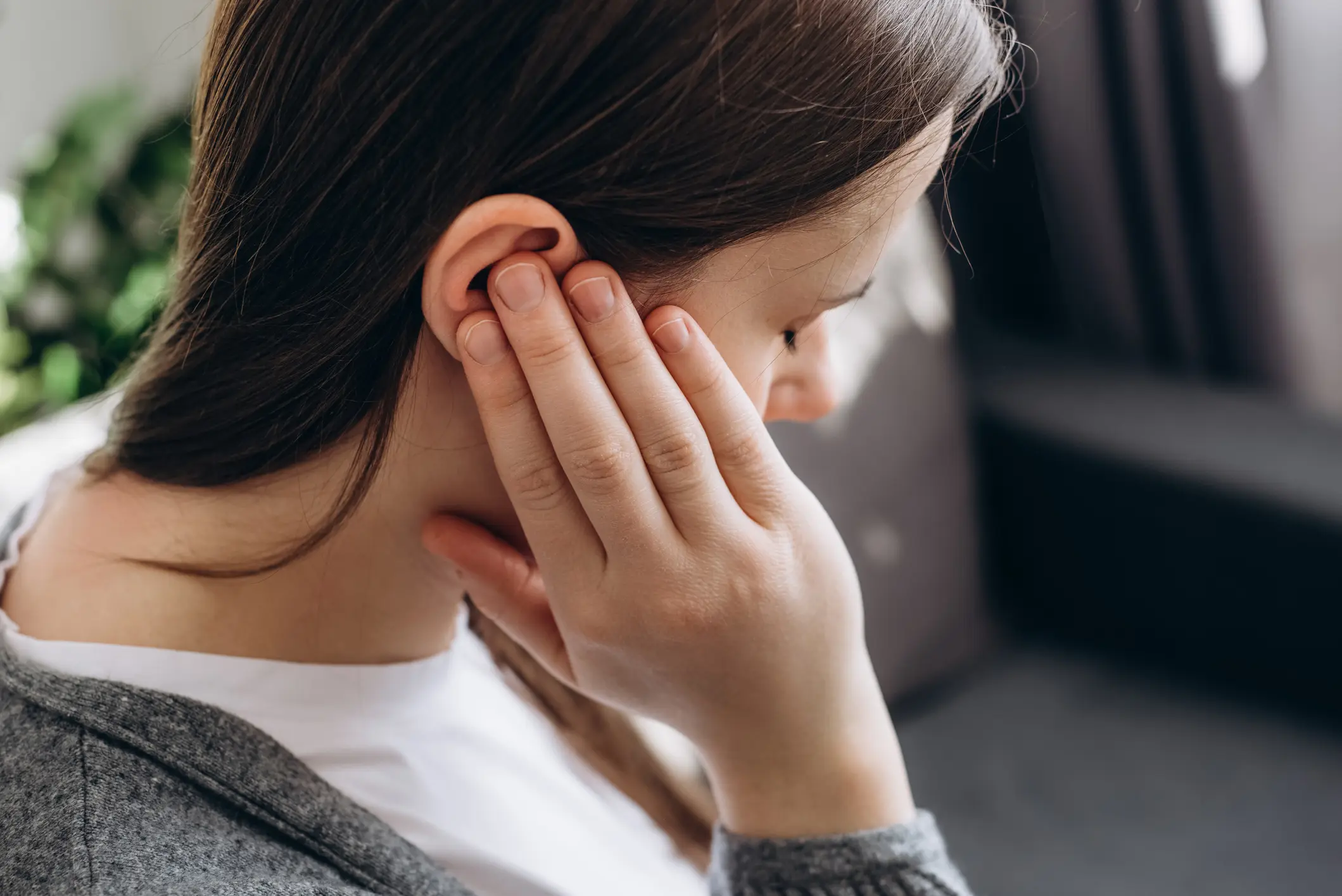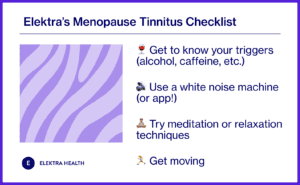
Published on Aug 25, 2025
Last modified on Dec 22, 2025
Why Are My Ears Ringing? Menopause and Tinnitus Explained
5 min read
Noticing ringing or buzzing sounds in your ear that just don’t seem to go away, even in a quiet space? It’s not just you. Tinnitus impacts up to 14% of middle-aged adults and 24% of older adults, and can range in severity from vaguely annoying to genuinely disruptive. We’re breaking down the relationship between perimenopause and tinnitus, whether or not it’s permanent, and what you can do about it.
What is tinnitus?
Tinnitus refers to the perception of sound where no external sound is present. Oftentimes, it manifests as a ringing noise, but can also sound like whistling, swooshing, buzzing, and even clicking. Needless to say, it can be quite maddening.
What causes tinnitus?
Tinnitus itself is not a disease, but a symptom. While the exact cause of tinnitus is fuzzy (no pun intended), it is often a symptom of medical conditions including…
- Age-related hearing loss: There are minuscule hairs in our cochlea (or inner-ear) that move when sound waves enter our ear, triggering electrical signals to the auditory nerve in our brain, which interprets them as sound. As we age, these hairs can become damaged due to wear and tear, which can cause hearing loss, with tinnitus being a major symptom.
- Noise-induced hearing loss: Long-term exposure to loud noises can result in permanent damage to the hair cells in our ear, similar to age-related hearing loss.
- Ear wax or head congestion: Blockages in the ear like earwax or head congestion can harm our ability to hear, which the auditory system may overcompensate for by creating noises that aren’t caused by external sources, aka tinnitus.
- Ear infection: Ear infections cause swelling in the ear, leading to pressure on the eardrum, which normally helps to transit sound signals to the brain. Too much pressure can cause ringing.
Certain medications like ibuprofen, antibiotics, and antidepressants can also cause tinnitus as a side effect.
Does menopause cause ear ringing?
You’ve probably heard us say it before, and you’ll definitely hear us say it again: there’s still a lot of unknowns around midlife women’s health, notwithstanding the relationship between hearing and the menopause transition. Some women do report tinnitus or hearing loss around menopause, as well as other periods of hormonal fluctuations such as pregnancy and around the menstrual period.
We know that there are estrogen/oestrogen receptors in the inner ear and auditory pathways that may be impacted by estrogen drops, perhaps due to changes in blood flow. That said, research has yet to establish a concrete cause-and-effect relationship.
Does tinnitus from menopause go away?
Oftentimes, yes. If you’re experiencing recurrent tinnitus, the first step is to reach out to your provider to rule out any serious causes such as neurological disorders. Depending on your symptoms, they may recommend you see an audiologist for tests.
Treatment for tinnitus depends on the cause. For instance, age-related hearing loss will require a different course of treatment, such as hearing aids, than earwax building – which will require physical removal of the obstruction. The good news is, tinnitus often goes away on its own or improves with time.
Treating tinnitus in menopause
Can hormone therapy help?
Menopausal hormone therapy (previously referred to as hormone replacement therapy or HRT) is commonly used for the management of menopausal symptoms like hot flashes and night sweats. While it isn’t prescribed for the treatment of tinnitus alone, there is some thought that MHT may decrease the risk of tinnitus in menopausal women. However, studies thus far on the relationship between MHT and tinnitus have yielded contradictory results.
Check out Elektra’s full guide to menopause hormone therapy >>
What you can do on your own…
- Get to know your triggers. Sometimes, certain conditions like poor sleep, extreme stress levels, or alcohol consumption can worsen tinnitus. If you’re experiencing ear ringing frequently, try making a simple log including onset of symptoms; you may be able to identify a trigger.
- Use a white noise machine. Playing white noise or music can help distract your brain from tinnitus, which can be especially helpful at night if the symptom is keeping you up.
- Try meditation or relaxation techniques. Mindfulness-based stress reduction is a mind-body intervention that helps people practice self-awareness through meditation. It is shown to help with anxiety and depression, as well as decreased severity in tinnitus symptoms.
- Get moving. Some research suggests that higher levels of physical activity may be associated with reduced tinnitus symptoms. Of course, regular exercise is also great for our overall health and can help with other menopausal symptoms.

The bottom line
Tinnitus is a frustrating symptom no matter the cause, but especially when accompanied by other unwelcome effects of hormonal changes in menopause. Lifestyle interventions like mindfulness, exercise, and white noise can help, but if symptoms persist beyond three months, we recommend reaching out to your provider.
READ MORE:


